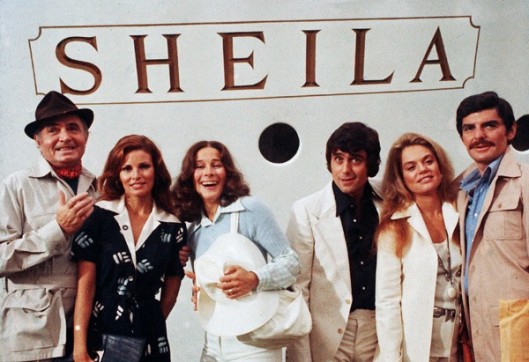Tags
 Herbert Ross’s The Last of Sheila is a malicious entertainment that could only have been made in the cynical, jaded, 1970s. Set on a luxury yacht touring the Côte d’Azur, the script by Stephen Sondheim and Anthony Perkins throws together a handful of Hollywood insiders who nip at each other’s heels like ferocious chihuahuas. The alpha male of the pack is Clinton Green (James Coburn), a sadistic manipulator and games player whose idea of fun is to create elaborate charades calculated to make the other puppies yelp with embarrassment.
Herbert Ross’s The Last of Sheila is a malicious entertainment that could only have been made in the cynical, jaded, 1970s. Set on a luxury yacht touring the Côte d’Azur, the script by Stephen Sondheim and Anthony Perkins throws together a handful of Hollywood insiders who nip at each other’s heels like ferocious chihuahuas. The alpha male of the pack is Clinton Green (James Coburn), a sadistic manipulator and games player whose idea of fun is to create elaborate charades calculated to make the other puppies yelp with embarrassment.
I’d read about Sheila before seeing it, and the first thing about it that struck me was not so much the nastiness as the wordiness. At first I attributed the verbosity to Sondheim, but I eventually realized that the compulsive chatter was as much a reflection of the time when the film was made as its fussy, cluttered cinematography. The ’70s were, for example, the high point of Neil Simon’s popularity. Theatrical, bitchy gamesmanship had already proven a hit in Sleuth (directed by Joseph Mankiewicz) and was to do so again in Sidney Lumet’s Deathtrap.
The point being that the filmmakers seem to equate such verbal superficiality with smarts, particularly when they combine it with inside dope. Casting James Mason as Philip, a “little child molester,” for example, is a nudging reminder of his performance in Kubrick’s Lolita. Or when the gamesters arrive at a secluded monastery and Anthony (Ian McShane) describes the atmosphere as “rather like a Hammer Film,” viewers are expected to know what he’s talking about and share the joke. The film is almost the definition of “knowing” humor, in other words, and makes no apologies for laying on the neurotic natter.
Which may make it “smart” in a self-congratulatory way, but Sheila is about smug superiority, not penetrating insight. Your opinion of its success is likely to hinge on whether you can enjoy the film’s inside jokes, revel in the depictions of Hollywoodians as self-destructive, envious losers and accept Ross’s clumsily elaborate execution. As to the former, the cast and sharp writing make it relatively easy to enjoy the shenanigans. Dyan Cannon’s wonderful burlesque as the over-sexed, overripe agent Christine is especially winning.
Ross’s contributions are a little tougher to swallow. He was also at his peak in the ’70s, but without denying his occasional ability to produce entertaining films (like The Seven Percent Solution), you’re often too aware of him striving for effect, of his efforts to overcome a lack of cinematic instinct. His skill with actors and nose for a good script assure that his films are at least engaging, but his strong points are often marred by an arbitrary artiness heavily imposed on the material in an elusive quest for style. Plastered on the sadomasochistic games of The Last of Sheila, it is a coin toss whether viewers will find the results of his strenuous efforts appealing or appalling.
